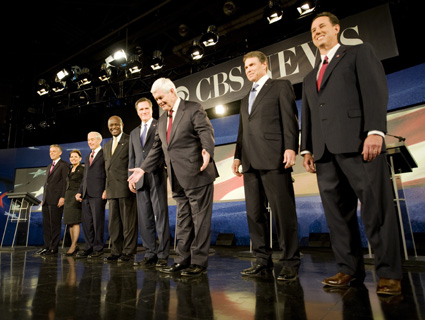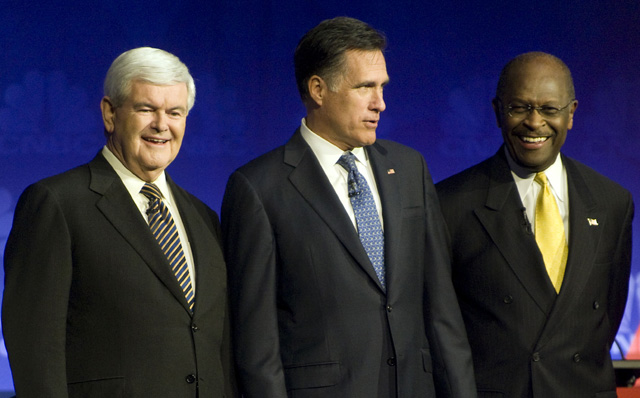 Mark Bialek/Zuma
Mark Bialek/Zuma
Read on for the Mother Jones news team’s instant analysis of Tuesday night’s GOP presidential debate in Washington, DC.
Cain and Santorum Call for Airport Profiling
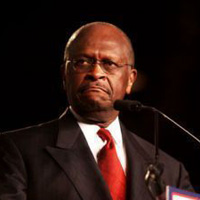 Gage Skidmore/Flickr
Gage Skidmore/Flickr
Tuesday night’s GOP presidential debate in the Belly of the Beast (Washington, DC) began with a lengthy discussion on the Patriot Act and civil liberties. Newt Gingrich announced his wholehearted support for the controversial law; Ron Paul, his total opposition. When it came to airport security, it was more of the same. Former Pennsylvania Sen. Rick Santorum told host Wolf Blitzer he believed the TSA should profile Muslim passengers. Herman Cain suggested that racial profiling might be overly simplistic (this from the creator of 9-9-9) but called for “targeted identification” at airports. As he put it, “The terrorists have one objective that some people don’t get, to kill all of us…We should use every means possible to kill them first or identify them first.”
The problem is that it’s not entirely clear what a terrorist looks like, and judging by Santorum and Cain’s answers, it’s not clear that they’ve thought too much about it.
To be sure, TSA screeners should be on the lookout for the guy in the security line with a banana clip yelling “Death to America!” But generally speaking, terrorists don’t look like that. Say you wanted to screen for Muslims, as Santorum suggests—how would you know who is a Muslim and who isn’t? It’s not on your passport, at least not yet. TSA screeners could look at the names and take a guess—but terrorists span the ethnic spectrum and have lots of different-sounding names. The name “Richard Reid” wouldn’t set off many alarm bells. José Pimentel, who was arrested in New York City on Sunday on terror charges, was Dominican and had a Hispanic surname. Are Latinos suspect? Dominicans specifically? What about African Americans? British nationals? The four Georgia men who plotted to spread ricin inside the Beltway were old white dudes upset about the plastic bag tax. Is Walter Matthau the new face of terror?
Israel has it easy when it comes to profiling. It has one major international airport, and it profiles Arabs without thinking twice about it. But that’s an impossible model to replicate.
Bachmann AGAIN Lies About the ACLU and the CIA
 Joe Burbank/Orlando Sentinel/Zuma
Joe Burbank/Orlando Sentinel/Zuma
During Tuesday’s national security debate on CNN, Rep. Michele Bachmann (R-Minn.) tripled down on her hallucination that the American Civil Liberties Union is exerting some broad influence over the Obama administration’s national security policies.
Bachmann narrowed her critique this time, arguing that Obama had “outsourced” interrogation policy to the ACLU because it allowed underwear bomber Umar Abdulmutallab, who pleaded guilty earlier this year, to be read his Miranda rights. Bachmann also said that the CIA is not allowed to play any role in interrogations. That is completely false.
Obama issued an executive order early in his presidency mandating that interrogations be governed by the Army Field Manual on interrogation, a document that was last updated during the Bush administration by Pentagon officials, not civil liberties advocates. The ACLU has actually objected to the current standards as still allowing techniques that could be considered coercive.
The CIA is part of the interagency High Value Interrogation Group (HIG) and as such plays a significant role in interrogating terror suspects. Defense Secretary Leon Panetta testified during his confirmation hearing in June that “if it’s someone where intelligence is the…primary objective here of going after and trying to find that out, then…the CIA individual becomes pretty central to the questions that are asked.”
So Bachmann’s criticism of Obama’s national security policy is based on two obvious and verifiable falsehoods: one, that current restrictions on interrogation are somehow based on the prerogatives of civil liberties advocates, and two, that the CIA no longer plays a role in interrogating terror suspects. Her criticism really just comes down to a complaint that the United States is no longer torturing people. Between the Obama administration’s hawkishness abroad and its relative continuity with Bush administration policy post-2006, torture is one of the only things Republicans have left to draw a contrast.
Romney Peddles Obama Defense-Spending Lie
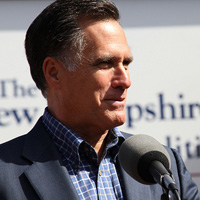 Mitt Romney/Flickr
Mitt Romney/Flickr
GOP presidential front-runner Mitt Romney used Tuesday night’s CNN presidential foreign policy debate to drag out a tired, debunked claim: that President Obama intends to cut $1 trillion from defense spending.
It’s not true: $600 billion of the cuts Romney is talking about will come via the “trigger,” the cuts written into the August deal to raise the nation’s borrowing limit. Those cuts go into effect in January 2013, but that’s thanks to the supercommittee’s recent failure to come up with another $1.2 trillion in savings—not Obama’s nonexistent anti-military jihad.
The other $400 billion of Romney’s $1 trillion? They don’t exist, as Foreign Policy‘s Josh Rogin reported in September:
The White House’s gambit is only its latest attempts to claim savings from cutting defense when actually no cuts exist. The White House claimed it had cut $350 billion from defense over ten years as part of the debt ceiling deal, but actually there are no defense cuts in the bill.
What the bill does is set spending caps for “security” spending, which the administration defines as defense, homeland security, intelligence, nuclear weapons, diplomacy, and foreign aid. There’s no breakdown that defines which of these agencies get what, so there’s no way to be sure that all the cuts would come from “defense.” Moreover, the spending caps are split between “security” and “non-security” discretionary spending only for fiscal 2012 and fiscal 2013.
If the next five Congresses actually cut the defense budget by $350 billion and if the Congressional supercommittee fails to find another $900 billion in discretionary cuts, that would “trigger” another $600 billion cuts in defense over ten years. Added to the $350, that would total about $1 trillion in defense “savings.”
The fact is that the Obama administration has made no serious attempt to curb military spending. And if Congress finds a way to renege on the sequester-mandated defense cuts (as defense hawks have been pleading), the other $600 billion worth of cuts won’t materialize, either.
2003 Newt: Rein in the Patriot Act
 Robin Nelson/Zuma
Robin Nelson/Zuma
Newt Gingrich opened tonight’s CNN debate by saying he would support strengthening the Patriot Act, the controversial law that vastly expanded the reach of America’s intelligence and law enforcement agencies in the wake of the 9/11 attacks.
“I think you want to use every tool you can possibly use,” the former speaker of the House said.
That doesn’t exactly square with what Gingrich wrote in an op-ed for the San Francisco Chronicle in 2003:
While I applaud the great successes of the Patriot Act in aiding law enforcement and intelligence agencies, agencies that have successfully disrupted terrorist plots and cells within the United States, I strongly believe the Patriot Act was not created to be used in crimes unrelated to terrorism…
We must demonstrate to the world that America is the best example of what a solid Constitution with properly enforced laws can bring to those who desire freedom and safety. If we become hypocrites about our own legal system, how can we sell it abroad or question legal systems different than our own?
I strongly believe Congress must act now to rein in the Patriot Act, limit its use to national security concerns and prevent it from developing “mission creep” into areas outside of national security.
2011 Newt wants a robust Patriot Act; the lily-livered, 2003 Newt didn’t seem so committed. Views can change. But Gingrich’s inconsistency on one of the central civil liberties questions of the post-9/11 era should give primary and caucus voters serious pause.
Tonight’s Debate Wrap-Up (Sort Of)
I’m sorry, but I just don’t have it in me to try and say something intelligent about tonight’s debate. Generally speaking, it wasn’t quite the train wreck that some of the others have been, but that’s faint praise. And it’s appalling that for the second time in a row, a foreign policy debate had no questions—not one—about Europe. The entire continent is on the verge of imploding, and possibly taking us down with them, and Wolf Blitzer doesn’t care. And at the end, when the candidates got a freebie question to talk about any issue they felt wasn’t getting enough attention, no mention of Europe again. It’s just baffling.
Anyway, here’s my Twitter stream for the night. That’s the best I’ve got for you.
5:08 p.m. Good to see Romney singing along. Looks authentic!
5:25 p.m. I think Santorum just lost the Muslim vote.
5:28 p.m. Newt Gingrich is….AWESOM-O!! ow.ly/7CnWd
5:32 p.m. “Huntsman’s problem….is that he doesn’t seem to hate Democrats.” ow.ly/7Co0n
5:34 p.m. Hey, Perry mentioned India! Progress!
5:56 p.m. And literally. RT @RichLowry: did newt just use candidly and frankly w/n abt 5 words?
6:04 p.m. How much oil does Gingrich think we have in America?
6:04 p.m. Oh, and Lean Six Sigma!
6:10 p.m. Perry seems unaware that budget trigger was originally a Republican proposal.
6:13 p.m. How long are we going to have to wait this time before Europe gets mentioned?
6:41 p.m. This debate is only two hours, right?
6:42 p.m. Why are candidates promoting drones on border instead of blimps? America needs a stronger blimp fleet.
6:43 p.m. Jeez, such a whiner. RT @MaxBoot: No mention yet of Arab Spring, with demonstrations in Egypt, open revolt in Syria, etc.
6:45 p.m. Already spent an hour talking about Iran, Iraq, Israel, Pakistan. But we’re going to “widen” the conversation by going to the Middle East?
6:46 p.m. Surprise final questioner will be George W. Bush! #secretsourcestoldme
6:50 p.m. RT @RichLowry: a no fly zone is not a sanction its an act of war
7:05 p.m. Virtues again from Perry. Is this some kind of dog whistle I don’t understand?
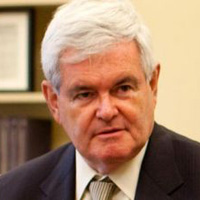 Pete Souza/Wikimedia Commons
Pete Souza/Wikimedia Commons
Newt Comes Out As an Immigration Moderate
Newt Gingrich came out as an immigration moderate during Tuesday night’s CNN GOP foreign policy debate, urging his colleagues to consider the consequences of mass deportation of unauthorized immigrants who have been in the country for a long time. Gingrich said that as the party of “the family,” the GOP shouldn’t be involved in breaking up families. The Obama administration has deported more than a million unauthorized immigrants, drawing harsh criticism from immigration reform advocates.
To be sure, Gingrich is no liberal when it comes to immigration. While Gingrich suggested an exception for some unauthorized immigrants who have remained in the United States for years, he still called for expelling all recent undocumented immigrants, implementing a guest worker program, and establishing an employer verification system. He also suggested that a military-only version of the DREAM Act that would provide a path to citizenship to unauthorized immigrants brought here as children. That sounds a lot like what President George W. Bush wanted to do when he proposed immigration reform during his second term in office.
Romney at first said he opposed amnesty because it would be a “magnet” for further illegal immigration. (He supported Bush’s immigration reform proposal last time around.) After Gingrich spoke rather specifically about policy, however, Romney backed down and said he wasn’t going start saying who was going to be allowed to stay and who wasn’t. After all, he’s running for office, for pete’s sake.
Gingrich’s moderation on immigration may put his newly crowned front-runner status at risk. Rick Perry’s slide in the polls began after he suggested critics of his decision to extend in-state tuition rates to unauthorized immigrants brought to the US as children were “heartless.” Gingrich, however, came across far more knowledgeable on the issue and managed to state his position without implying his critics were callous or racist. That may make some difference.
“I’m willing to be tough, but I’m not willing to kid people,” Gingrich told CNN anchor Gloria Borger after the debate.
No, Rick Perry, the Border Is Not Getting More Violent
 Gov. Rick Perry/Flickr
Gov. Rick Perry/Flickr
Although Tuesday’s GOP presidential debate was billed as foreign policy and national security debate, the candidates spent much of the night discussing domestic issues like the supercommittee and immigration. And that led to one of the night’s biggest whoppers—albeit one Republican candidates have a tendency to repeat over and over: The suggestion, from Phil Truluck of the Heritage Foundation, that the southern border has become more and more violent Texas Governor Rick Perry claimed that, under President Obama’s watch, the southern border has become more and more violent.
As it happens, the Austin American-Statesman examined the numbers in-depth last month, and reported that in Texas, border violence has actually gone down:
[A] closer look at crime numbers in border counties since 2006—the year Mexican violence began to spike in earnest—does not reveal evidence of out-of-control chaos. An American-Statesman analysis of all 14 counties that share a border with Mexico and two dozen border cities shows that violent crime along the Texas side of the Rio Grande fell 3.3 percent between 2006 and 2010.
During the same period, the combined number of murders in the 14 counties fell 33 percent, to 73 in 2010 from 97 in 2006.
Further, most counties and cities situated directly across from the worst of the Mexican violence also saw their crime rates decrease, even as thousands were slaughtered on the Mexican side.
Read the whole story.
Update: As a commenter points out, I rushed to put this up without double-checking the transcript: Truluck brought up the figure, not Perry. Mea culpa. Perry didn’t really answer the question or address the point, although he has made much the same point with regularity—most notably at a debate in September.
 Rob Widdis/Mct/ZUMA PressRomney: Indict Ahmadinejad for “Violating the Genocide Convention”
Rob Widdis/Mct/ZUMA PressRomney: Indict Ahmadinejad for “Violating the Genocide Convention”
—By Asawin Suebsaeng
When asked about Iran and Israel at Tuesday’s CNN national security debate, on-and-off Republican front-runner Mitt Romney replied in his typically tough, unambiguously pro-Israel fashion. After chiding the Obama administration for being “disrespectful to our friends” and playing softball with our foes, Romney said that as president he would take the necessary steps to confront the Iranian regime. One of the hallmarks of his plan: indicting Iranian President Mahmoud Ahmadinejad for “violating the genocide convention.” (During the debate, Romney first said “Geneva Conventions” before backtracking and going with “genocide convention.”)
You could give Romney the benefit of the doubt, and assume that he actually did mean to say the “Geneva Conventions” and that, under the pressure of a nationally televised debate, he merely misspoke. But Romney simply meant what he meant; he has been calling for this indictment since at least the end of 2007. Here’s an AP report from September of that year:
“The Iranian regime under President Ahmadinejad has spoken openly about wiping Israel off the map, has fueled Hezbollah’s terror campaign in the region and around the world and defied the world community in its pursuit of nuclear weapons — capabilities that make these threats even more ominous,” Romney said in a letter to U.N. Secretary General Ban Ki-moon posted on his campaign Web site, www.mittromney.com.
In New York, Romney told reporters: “I think the invitation should be withdrawn. I think instead, Ahmadinejad should be indicted under the Genocide Convention.”
Because Romney has been calling for this indictment since before Iran’s bloody Green Movement protests, it’s safe to assume that he was specifically referring to the Iranian President’s over-the-top, alleged call for Israel to “be wiped off the map.”
And here’s where candidate Romney again steps into the murky waters of international law: The Convention on the Prevention and Punishment of the Crime of Genocide, as adopted by the United Nations General Assembly in the years after World War II, defines genocide as any number of “acts committed with intent to destroy, in whole or in part, a national, ethnical, racial or religious group.”
Experts in the field cite an array of factors that would almost certainly impede Romney’s proposed foreign policy initiative. “There are so many layers to [Romney’s] argument that need to be explored because the implications are very serious,” says Elizabeth Blackney, an anti-genocide activist and communications strategist. Blackney also argues that before any potential Romney administration can determine if Ahmadinejad’s comments or threats would justify US support for an indictment, the former Massachusetts governor needs to elaborate on his plans. “US policy has been to not honor the International Criminal Court; we are not a signatory to the Rome Treaty. So is Romney signaling that he would recommend law enforcement under the [statute]… and fundamentally change American policy toward the ICC and the Genocide Convention? [His comment during the debate] was not very well thought out.”
While there have been other voices arguing in favor of such an indictment, it’s widely interpreted that a statement supposedly egging on genocide is not legally considered a tool of genocide, unless it can be taken into evidence as proving direct intent and premeditation. Furthermore, it would be unprecedented to indict a foreign leader for a genocide that hasn’t even taken place yet.
